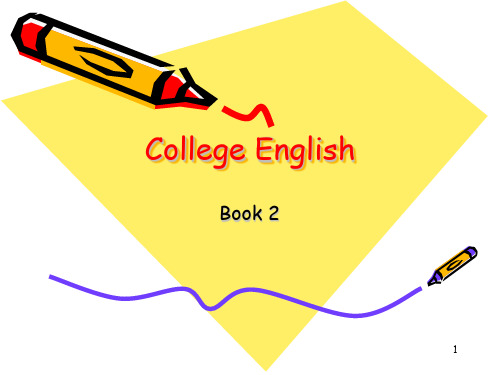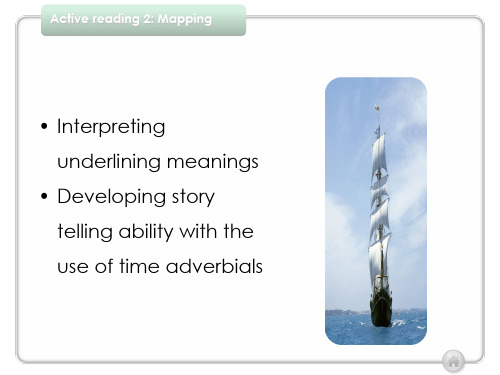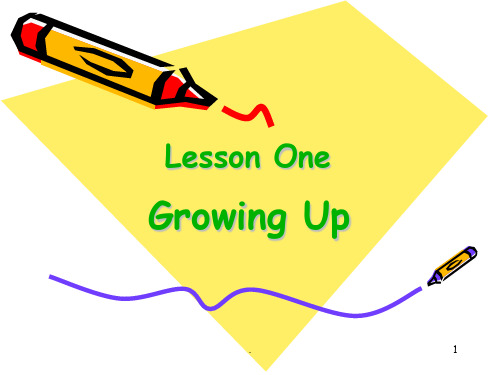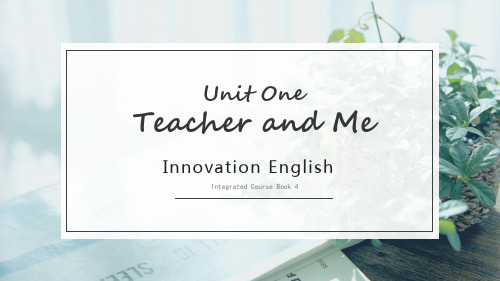大学英语综合教程.ppt
合集下载
大学英语综合教程 ppt课件ppt课件

01
Course Introduction
Chapter
Improve students' English listening, speaking, reading, and writing abilities
Developing students' cross-cultural communication skills
Through PPT courseware, deepen understanding of course content and improve learning effectiveness.
Collaborative learning
Learn together with classmates, share knowledge and experience, help each other, and progress together.
Textbook
Use the Comprehensive Course of College English to master basic knowledge and skills.
要点三
Comparison of Chinese and Western Thinking Styles: Comparative analysis of the differences in thinking styles, cognitive styles, and values between the East and the West, as well as the impact of these differences on cross-cultural communication.
Reasonably utilize learning resources, such as time, environment, and learning partners, to improve learning efficiency.
Course Introduction
Chapter
Improve students' English listening, speaking, reading, and writing abilities
Developing students' cross-cultural communication skills
Through PPT courseware, deepen understanding of course content and improve learning effectiveness.
Collaborative learning
Learn together with classmates, share knowledge and experience, help each other, and progress together.
Textbook
Use the Comprehensive Course of College English to master basic knowledge and skills.
要点三
Comparison of Chinese and Western Thinking Styles: Comparative analysis of the differences in thinking styles, cognitive styles, and values between the East and the West, as well as the impact of these differences on cross-cultural communication.
Reasonably utilize learning resources, such as time, environment, and learning partners, to improve learning efficiency.
全新版大学英语综合教程第二册ppt课件

*
Benjamin loved to carry the key around, shaking it vigorously. He also liked to try to place it into the slot. Because of his tender age and incomplete understanding of the need to position the key just so, he would usually fail. Benjamin was not bothered in the least. He probably got as much pleasure out of the sounds the key made as he did those few times when the key actually found its way into the slot. Now both Ellen and I were perfectly happy to allow Benjamin to bang the key near the key slot. His exploratory behavior seemed harmless enough. But I soon observed an interesting phenomenon. Any Chinese staff member nearby would come over to watch Benjamin and, noting his lack of initial success, attempt to assist. He or she would hold onto Benjamin's hand and, gently but firmly, guide it directly toward the slot, reposition it as necessary, and help him to insert it. The "teacher" would then smile somewhat expectantly at Ellen or me, as if awaiting a thank you — and on occasion would frown slightly, as if considering us to be neglecting our parental duties. I soon realized that this incident was directly relevant to our assigned tasks in China: to investigate the ways of early childhood education (especially in the arts), and to throw light on Chinese attitudes toward creativity. And so before long I began to introduce the key-slot anecdote into my discussions with Chinesoward Gardner, a professor of education at Harvard University, reflects on a visit to China and gives his thoughts on different approaches to learning in China and the West. LEARNING, CHINESE-STYLE Howard Gardner For a month in the spring of 1987, my wife Ellen and I lived in the bustling eastern Chinese city of Nanjing with our 18-month-old son Benjamin while studying arts education in Chinese kindergartens and elementary schools. But one of the most telling lessons Ellen and I got in the difference between Chinese and American ideas of education came not in the classroom but in the lobby of the Jinling Hotel where we stayed in Nanjing. The key to our room was attached to a large plastic block with the room number on it. When leaving the hotel, a guest was encouraged to turn in the key, either by handing it to an attendant or by dropping it through a slot into a box. Because the key slot was narrow, the key had to be positioned carefully to fit into it.
Benjamin loved to carry the key around, shaking it vigorously. He also liked to try to place it into the slot. Because of his tender age and incomplete understanding of the need to position the key just so, he would usually fail. Benjamin was not bothered in the least. He probably got as much pleasure out of the sounds the key made as he did those few times when the key actually found its way into the slot. Now both Ellen and I were perfectly happy to allow Benjamin to bang the key near the key slot. His exploratory behavior seemed harmless enough. But I soon observed an interesting phenomenon. Any Chinese staff member nearby would come over to watch Benjamin and, noting his lack of initial success, attempt to assist. He or she would hold onto Benjamin's hand and, gently but firmly, guide it directly toward the slot, reposition it as necessary, and help him to insert it. The "teacher" would then smile somewhat expectantly at Ellen or me, as if awaiting a thank you — and on occasion would frown slightly, as if considering us to be neglecting our parental duties. I soon realized that this incident was directly relevant to our assigned tasks in China: to investigate the ways of early childhood education (especially in the arts), and to throw light on Chinese attitudes toward creativity. And so before long I began to introduce the key-slot anecdote into my discussions with Chinesoward Gardner, a professor of education at Harvard University, reflects on a visit to China and gives his thoughts on different approaches to learning in China and the West. LEARNING, CHINESE-STYLE Howard Gardner For a month in the spring of 1987, my wife Ellen and I lived in the bustling eastern Chinese city of Nanjing with our 18-month-old son Benjamin while studying arts education in Chinese kindergartens and elementary schools. But one of the most telling lessons Ellen and I got in the difference between Chinese and American ideas of education came not in the classroom but in the lobby of the Jinling Hotel where we stayed in Nanjing. The key to our room was attached to a large plastic block with the room number on it. When leaving the hotel, a guest was encouraged to turn in the key, either by handing it to an attendant or by dropping it through a slot into a box. Because the key slot was narrow, the key had to be positioned carefully to fit into it.
大学英语综合教程unit1精ppt课件

3. What did Baker hear about Mr. Fleagle? What was his own impression (印象) of his new English teacher? [He heard that Mr. Fleagle was dull, formal, rigid, and hopelessly out of date, and unable to inspire. He thought he was excessively prK 1 - Unit 1 - Text A - Comprehension
8. What was Baker prepared for when he found all the papers were given back but his? [He was preparing himself for a command to report to Mr. Fleagle immediately after school for discipline.] 9. What was Mr. Fleagle's announcement? [He announced that he wanted to read an essay to the class.] 10. Whose essay was Mr. Fleagle reading to the class? How did the class respond (反应)?
.
BOOK 1 - Unit 1 - Text A - Comprehension
1. One of you asks the first six questions and the other answers. Starting from question 7, change roles. When you have finished, the teacher may want to put some of the questions to you for a check.
8. What was Baker prepared for when he found all the papers were given back but his? [He was preparing himself for a command to report to Mr. Fleagle immediately after school for discipline.] 9. What was Mr. Fleagle's announcement? [He announced that he wanted to read an essay to the class.] 10. Whose essay was Mr. Fleagle reading to the class? How did the class respond (反应)?
.
BOOK 1 - Unit 1 - Text A - Comprehension
1. One of you asks the first six questions and the other answers. Starting from question 7, change roles. When you have finished, the teacher may want to put some of the questions to you for a check.
新标准大学英语综合教程2课件ppt

•病原体侵 入机体 ,消弱 机体防 御机能 ,破坏 机体内 环境的 相对稳 定性, 且在一 定部位 生长繁 殖,引 起不同 程度的 病理生 理过程
Active reading 2: embarkation
Making prediction
Read the first and last lines of each paragraphs and decide whether the statement is true or false.
Destination index
Summarising
Inventing stories
•病原体侵 入机体 ,消弱 机体防 御机能 ,破坏 机体内 环境的 相对稳 定性, 且在一 定部位 生长繁 殖,引 起不同 程度的 病理生 理过程
Active reading 2 :Destination
Summarising
Situation 2: introduce yourself to a new person online
Situation 3: sell yourself at a job interview
Situation 4: introduce yourself to a family friend (older generation)
•病原体侵 入机体 ,消弱 机体防 御机能 ,破坏 机体内 环境的 相对稳 定性, 且在一 定部位 生长繁 殖,引 起不同 程度的 病理生 理过程
Active reading 2: Mapping
• Interpreting underlining meanings
• Developing story telling ability with the use of time adverbials
全新版大学英语第二版综合教程unit1完整ppt课件

现方式做保护处理对用户上传分享的文档内容本身不做任何修改或编辑并不能对任何下载内容负责
Lesson One
Growing Up
.
1
Text A Writing For Myself
Part I Part II Part III Part IV Part V Part VI Part VII
.
5
Part Three Comprehension Questions
Para.1 When did the author’s dream of becoming a writer seem possible? Why had he felt bored by everything associated with English courses?
10. reputation : opinion about sth. or sb. held by others
The manager’s deadly mistake almost ruined his high
~ among employees.
Charles Chaplin had quite a ~ for being comic.
Nowadays most children go to school but few of them have ever asked themselves why they go there. Some children think that they go to school just to learn their mother tongue, English and other foreign languages, mathematics, geography, history, science and a few other subjects. But why do they learn these things? Are these the only things they should learn at school?
Lesson One
Growing Up
.
1
Text A Writing For Myself
Part I Part II Part III Part IV Part V Part VI Part VII
.
5
Part Three Comprehension Questions
Para.1 When did the author’s dream of becoming a writer seem possible? Why had he felt bored by everything associated with English courses?
10. reputation : opinion about sth. or sb. held by others
The manager’s deadly mistake almost ruined his high
~ among employees.
Charles Chaplin had quite a ~ for being comic.
Nowadays most children go to school but few of them have ever asked themselves why they go there. Some children think that they go to school just to learn their mother tongue, English and other foreign languages, mathematics, geography, history, science and a few other subjects. But why do they learn these things? Are these the only things they should learn at school?
大学英语综合教程 U1课件

Text A
⑩ The site has a small paid staff, according to the co-founder, and relies on hundreds of student volunteers who monitor postings for accuracy and taste in the US, Canada and now Britain and Ireland. Anyone can click a tiny red flag next to a comment to automatically remove it from the site pending review by a staff member.
⑨ On the platform of evaluation teaching network, students pay nothing to look at ratings or rate their teachers. The site is profitable, which makes money from advertising and from paid memberships.
④ Others aren’t so sure. The rapid growth of the site — which boasts ratings for 887,000 public and private school teachers in four countries — is provoking a backlash. The site’s creators estimate that hundreds of school districts have cut off Internet access to the site. And teachers, many of them stung by blunt or crass comments on the site, are crying foul. They don’t think children should be able to anonymously rate their teachers, even though older students have long had that freedom on many university campuses.
外教社2024全新版大学进阶英语系列:综合教程(第二版) 第3册PPT课件(试用版)Unit 6 D
There’s so much 7) strength in all of us Every woman, child, and man It’s the moment that you think you can’t You’ll discover that you 8) can
Theme Exploration
Getting Prepared
Warm-up Video
Notes
Toxic Substances Control Act (TSCA):《有毒物质控制法》。 该 法 案 1976 年 经 美 国 国 会 通 过 , 由 环 境 保 护 局 (Environmental Protection Agency)执行。其中规定在化学 新产品投产前,厂商必须通知E.P.A.,提供有关信息,由后 者判定是否禁止或限制该产品的生产。由于不要求厂商必 须首先通过安全性测试确定产品无害,该法案被很多人认 为是一个“没有牙齿”的法案。
Feel the flame (forever burn) Teaching lessons we must learn (To bring us closer to) the power of the dream The world units in hope and peace (We’ll pray that) it will always be (It is) the power of the dream that brings us here
The Power of the Dream
Deep within each heart There lies a magic spark That lights the fire of our 1) imagination And since the dawn of man The strength of just “I can” Has brought together people of all nations There’s nothing 2) ordinary in the living of each day There’s a special part every one of us will play
Theme Exploration
Getting Prepared
Warm-up Video
Notes
Toxic Substances Control Act (TSCA):《有毒物质控制法》。 该 法 案 1976 年 经 美 国 国 会 通 过 , 由 环 境 保 护 局 (Environmental Protection Agency)执行。其中规定在化学 新产品投产前,厂商必须通知E.P.A.,提供有关信息,由后 者判定是否禁止或限制该产品的生产。由于不要求厂商必 须首先通过安全性测试确定产品无害,该法案被很多人认 为是一个“没有牙齿”的法案。
Feel the flame (forever burn) Teaching lessons we must learn (To bring us closer to) the power of the dream The world units in hope and peace (We’ll pray that) it will always be (It is) the power of the dream that brings us here
The Power of the Dream
Deep within each heart There lies a magic spark That lights the fire of our 1) imagination And since the dawn of man The strength of just “I can” Has brought together people of all nations There’s nothing 2) ordinary in the living of each day There’s a special part every one of us will play
全新版大学英语综合教程第一册课件
05
CATALOGUE
Sample essays
Provide examples of different types of essays, such as expository, argumentative, and narrative.
Model essay analysis
Analyze the structure, language use, and argumentation techniques employed in sample essays.
Customizable activities
Teachers can customize the activities in the courseware to suit their specific teaching needs and the needs of their students, ensuring that the activities are relevant and engaging for learners.
Course Introduction
01
CATALOGUE
Unit 1
Unit 3
Unit 5
Foundation Skills
Academic English
Culture and Communication
Lecture
The course includes in-depth lectures on various topics related to English language and culture.
The courseware includes role-play activities to simulate real-life communication scenarios, allowing students to practice their oral communication skills in a variety of contexts.
CATALOGUE
Sample essays
Provide examples of different types of essays, such as expository, argumentative, and narrative.
Model essay analysis
Analyze the structure, language use, and argumentation techniques employed in sample essays.
Customizable activities
Teachers can customize the activities in the courseware to suit their specific teaching needs and the needs of their students, ensuring that the activities are relevant and engaging for learners.
Course Introduction
01
CATALOGUE
Unit 1
Unit 3
Unit 5
Foundation Skills
Academic English
Culture and Communication
Lecture
The course includes in-depth lectures on various topics related to English language and culture.
The courseware includes role-play activities to simulate real-life communication scenarios, allowing students to practice their oral communication skills in a variety of contexts.
大学英语综合教程4unitPPT课件
• Inverted sentence: Inverted sentence refers to placing certain components (such as predicate, subject, etc.) at the beginning of a sentence to emphasize or change the sentence structure. For example, "Only in this way can we solve the problem."
01
Unit Introduction
Unit Theme
Summary
Unit Theme Introduction
Detailed description
The theme of this unit is "Global Climate Change", which mainly explores the current situation, causes and impacts of global climate change, as well as individual and social response strategies.
Teaching objectives
Summary
Explanation of teaching objectives
Detailed description
The teaching objectives of this unit include: cultivating students' reading comprehension ability, enabling them to master vocabulary and expressions related to global climate change, understanding the scientific principles of global climate change, and improving their critical thinking ability and environmental awareness.
01
Unit Introduction
Unit Theme
Summary
Unit Theme Introduction
Detailed description
The theme of this unit is "Global Climate Change", which mainly explores the current situation, causes and impacts of global climate change, as well as individual and social response strategies.
Teaching objectives
Summary
Explanation of teaching objectives
Detailed description
The teaching objectives of this unit include: cultivating students' reading comprehension ability, enabling them to master vocabulary and expressions related to global climate change, understanding the scientific principles of global climate change, and improving their critical thinking ability and environmental awareness.
大学英语综合教程课件unit
spare a thought for记得
spare a thought for our volunteer group at Christmas.
圣诞节别忘了我们的志愿者组织。
常用词组
05
04
02
03
01
spare sb.'s feelings不使某人难过[难堪]
She never spares the butter when baking.
4
volunteer
STEP5
STEP4
STEP3
STEP2
STEP1
n. 志愿者
We want some volunteers to help paint the house.
a.由志愿者组成的,或志愿者做的
He said his brothers were all volunteer firefighters.
He found it a shattering experience.
02
使心烦意乱,使震惊
I usually feel too shattered to do more than crawl into bed.
1
我通常疲惫得只有力气爬上床睡觉。
2
(非正式)使精疲力竭
supportive支持的,拥护的;赞助的
01
Accounting ethics会计道德
02
Business ethics商业道德
03
Economic ethics经济伦理
04
Legal ethics法的伦理学
05
Medical ethics医学伦理学,医德
06
Professional ethics职业道德
spare a thought for our volunteer group at Christmas.
圣诞节别忘了我们的志愿者组织。
常用词组
05
04
02
03
01
spare sb.'s feelings不使某人难过[难堪]
She never spares the butter when baking.
4
volunteer
STEP5
STEP4
STEP3
STEP2
STEP1
n. 志愿者
We want some volunteers to help paint the house.
a.由志愿者组成的,或志愿者做的
He said his brothers were all volunteer firefighters.
He found it a shattering experience.
02
使心烦意乱,使震惊
I usually feel too shattered to do more than crawl into bed.
1
我通常疲惫得只有力气爬上床睡觉。
2
(非正式)使精疲力竭
supportive支持的,拥护的;赞助的
01
Accounting ethics会计道德
02
Business ethics商业道德
03
Economic ethics经济伦理
04
Legal ethics法的伦理学
05
Medical ethics医学伦理学,医德
06
Professional ethics职业道德
- 1、下载文档前请自行甄别文档内容的完整性,平台不提供额外的编辑、内容补充、找答案等附加服务。
- 2、"仅部分预览"的文档,不可在线预览部分如存在完整性等问题,可反馈申请退款(可完整预览的文档不适用该条件!)。
- 3、如文档侵犯您的权益,请联系客服反馈,我们会尽快为您处理(人工客服工作时间:9:00-18:30)。
• Part II (Paragraphs 2-5) body of the speech: Churchill analyzed the world situation and how other countries looked at Britain and then called on the British people not to give in.
• What do you know of Winston Churchill?
Listening and Speaking
• Listen to a passage about Winston Churchill and discuss the following question:
What had Winston Churchill achieved in his lifetime as a statesman. an artist, a writer and a soldier?
• In World War II he was first lord of the admiralty (1939-40) and prime minister (1940-45). As such he became one of the great war leaders, leading Great Britain through World War II; his outstanding oratory maintained Britain's morale, and he was one of the main shapers of Allied (同盟国 的) strategy workingnt Roosevelt.
a combination of soldier, writer,
orator, artist and
World War (1948-1953),
and won the 1953 Nobel Prize for literature.
statesman
Text Comprehension
What is Churchill’s purpose of making the speech? • To encourage people to hold on in the stern situation.
Unit One
Text I “Never Give In, Never, Never, Never”
by Winston Churchill
An Integrated English Course Book 3
Pre-reading Questions
• Do you know when and how World War II broke out? What else do you know about it?
For your reference
Winston Churchill (1874-1965)
Greatest modern British statesman:
He was a direct descendant from the first Duke of Marlborough, the son of Lord Randolph Churchill.
renowned for his
courage, imagination,
oratory and intellect
• A postwar reaction cost his party the 1945
election, but he was again prime minister later
After an early career as an army officer and war correspondent he became a Conservative member of Parliament, in 1901, changing to the Liberals in 1905.
(1951- 55).
• In his later years, he
spent much time writing
history of the English-
speaking people and
painting. Churchill
published several works,
including The Second
• Part III (Paragraphs 6-8) closing remarks: By changing a word in the additional verse of the school song, Churchill expressed his conviction that this nation was determined to fight for the victory of this great war.
Structural Analysis
• Part I (Paragraph 1) opening remarks:
Churchill summarized the great events that had happened in the world with Great Britain in particular and then talked about the purpose of his visit to encourage the whole nation to fight against the Nazis.
• He was home secretary (内政大臣) (191011), a dynamic first lord of the admiralty (海军大臣) (1911-15), and held various government posts (1917-22).
• He was Conservative chancellor of the exchequer (财政大臣) (1924-29), but in the 1930s his unpopular demands for war preparedness kept him from power.
